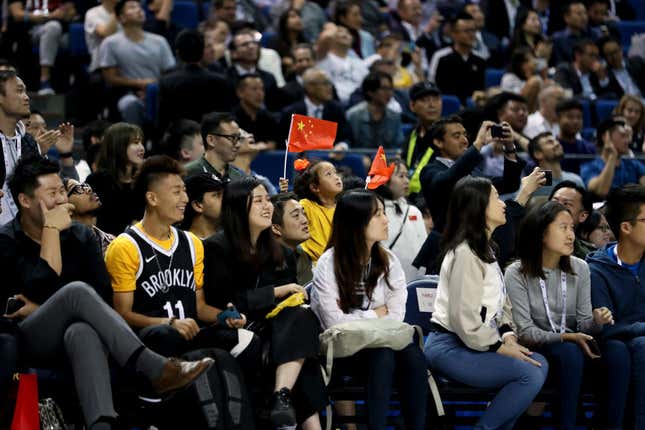
Over the last few days, many people in the NBA and wider sports media world have settled on a basic talking point when discussing the ongoing international incident that Rockets GM Daryl Morey kicked off when he tweeted a message of support for pro-democracy protestors in Hong Kong: It’s complicated. But is it all that complicated?
The various social and historical factors motivating both the Hong Kong protestors and the Chinese government’s violent response to them are certainly complicated, but there’s not much haze covering the points at which the NBA intersects this story. Is the question of whether one should feel sympathy for demonstrators who are being teargassed and beaten in the streets a complicated one? What about the question of whether an authoritarian government should attempt to censor and financially harm an American sports league over a single tweet?
Despite the easy answers to those questions, a fog of uncertainty and hesitation has been thrown over so many discussions of the NBA’s relationship with China. It seems to me that everyone took their cues from Nets owner Joe Tsai, who in a lengthy Facebook post insisted that in order to understand the damage Morey’s tweet did to a nation of 1.4 billion people, you have to understand the history of the Opium Wars, the Qing dynasty, and the Massacre of Nanjing. He wrote:
The one thing that is terribly misunderstood, and often ignored, by the western press and those critical of China is that 1.4 billion Chinese citizens stand united when it comes to the territorial integrity of China and the country’s sovereignty over her homeland. This issue is non-negotiable.
The sleight of hand here—which, as Slate’s Tom Scocca pointed out, is one routinely deployed in propaganda campaigns—should be obvious. Tsai is attributing the anger that the Chinese government and a few powerful corporations felt at the NBA to the Chinese population at large. This makes the backlash against Morey and the league not only seem more organic, but far more valid. If the GM of the Rockets really did piss off an entire country, who are any of us to say anything about it?
Plenty were eager to follow Tsai’s lead. Sports writers rushed to Twitter and television to let everyone know that the wisest course of action is to just steer clear of this complicated issue. The Athletic’s Joe Vardon wrote an explainer on the crisis that took Tsai’s comments at face value, and quoted someone from a think tank established to advocate for the Chinese government’s claims to the South China Sea. Steve Kerr said he needed to talk to his brother, a professor of Chinese history, before he could comment on the situation.
Perhaps nobody was more snowed in than The Ringer’s Bill Simmons, who on a podcast with the Wall Street Journal’s Jason Gay worried that angry protestors might beset Thursday’s preseason game between the Lakers and Nets in Shanghai. “Here’s what is in play, potentially: protestors. And protestors, in a foreign country, that has occasionally proven that it can be pretty dangerous, where you would have protestors outside the hotels, and you would have protestors outside the stadiums. And there is no guarantee that at some point that might not become a little bit unsafe,” he said. (He also brought up the fact that Steve Kerr’s father was murdered by an Islamic Jihadist as a good reason for Kerr not to comment on the NBA-China situation, the implication being, I suppose, that Kerr could have put himself in danger of being killed by a Chinese nationalist?)
The Lakers and Nets did end up playing on Thursday, and aside from a total lack of sponsorship logos and a government-mandated lack of press availability, a normal basketball game unfolded. Here’s how ESPN described the scene:
Many of the capacity crowd of 18,000 entered the arena toting hand-held Chinese flags that were being distributed outside. Before the starting lineups were announced, there was no singing of the national anthem — not the American “Star-Spangled Banner” nor the Chinese “March of the Volunteers.”
But it wasn’t completely foreign.
Whatever unrest existed in the days leading up to the game was not reflected by the crowd during pregame warm-ups, as cheers erupted in the stands with every LeBron James dunk. And there were plenty of them, as the Lakers forward was clearly putting on a show.
[...]
James continued to elicit adulation once play started, receiving boisterous approval after scoring the first bucket of the game on a layup and later hearing “MVP!” chants when shooting free throws during the first quarter.
The vibe inside the arena seems to have been no different from any other NBA game:
If it’s hard to square the image of two NBA teams walking into a Shanghai arena unmolested and playing a game in front of thousands of cheering fans with the supposed nationwide antagonism currently being directed at the NBA, maybe that’s because this story all far less complicated than Tsai and so many others have been insisting it is.
Morey certainly pissed off a good number of Chinese citizens with his tweet, but every year the NBA plays games in cities full of people who its players and coaches and executives have pissed off, and fans still come out to cheer. The only reason this particular instance rose to the level of an international crisis is because Morey crossed an authoritarian regime that decided to respond by throwing an extended tantrum, and they were assisted by American media members all too eager to muddy up the particulars of the story while striking a pose of removed sophistication. It’s okay to ignore all of that, and just discuss this story on the terms which actually apply. You don’t even need a degree in Chinese history to do so.